— A day after the pope’s announcement that Catholic priests may bless same-sex couples, one New York couple receives theirs.
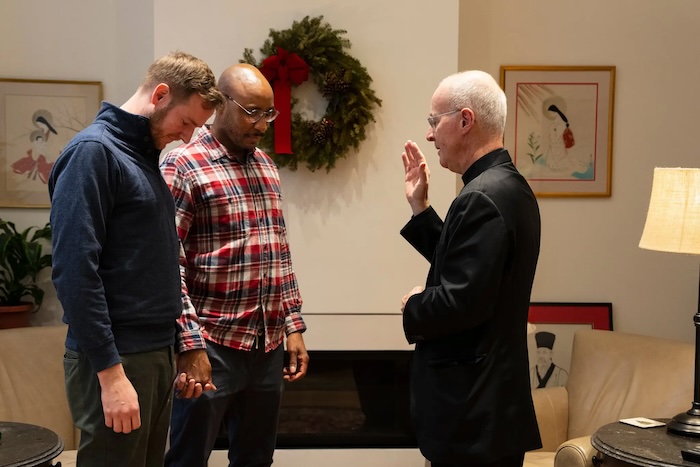
By Amy Harmon, Ruth Graham and Sarah Maslin Nir
As a Jesuit priest for more than two decades, the Rev. James Martin has bestowed thousands of blessings — on rosary beads, on babies, on homes, boats, and meals, on statues of saints, on the sick, on brides and on grooms.
Never before, though, was he permitted to bless a same-sex couple — not until Monday, when the pope said he would allow such blessings, an announcement that reverberated through the church.
On Tuesday morning, Damian Steidl Jack, 44, and his husband, Jason Steidl Jack, 38, stood before Father Martin in a living room on Manhattan’s West Side. The couple, running a bit late because of subway delays, dressed casually. Damian, a floral designer, complimented Father Martin on the pine smell of the Christmas tree.
In keeping with the Vatican’s admonition that such a blessing should not be performed with “any clothing, gestures, or words that are proper to a wedding,” Father Martin wore no robes, and read from no text. There is no blessing for same-sex couples in the thick book of blessings published by the U.S. Conference of Bishops. Instead he selected a favorite of his own from the Old Testament.
“May the Lord bless and keep you,” Father Martin began, touching the two men’s shoulders. They bowed their heads slightly, and held hands.
“May the Lord make his face shine upon you, and be gracious to you. May the Lord turn his countenance to you and give you joy and peace.
“And may almighty God bless you,” he said, making the sign of the cross, “the Father, the Son, and the Holy Spirit. Amen.”
And then, with emotion evident on their faces, the three men hugged.

Father Martin is arguably the highest-profile advocate for L.G.B.T.Q. Catholics in America. He has met frequently with Pope Francis about making the Roman Catholic Church more inclusive, and in the fall he participated in a global gathering on the church’s future at the pope’s invitation.
On Tuesday morning, he was far from the halls of power. He was at home, making history. Father Martin had waited years for the privilege of saying such a prayer, however simple, out in the open.
“It was really nice,” Father Martin said on Tuesday, “to be able to do that publicly.”
The pope’s decision was greeted as a landmark victory by advocates for gay Catholics, who describe it as a significant gesture of openness and pastoral care, and a reminder that an institution whose age is measured in millenniums can change.
The decision does not overturn the church’s doctrine that marriage is between a man and a woman. It does not allow priests to perform same-sex marriages. It takes pains to differentiate between the sacrament of marriage — which must take place in a church — and a blessing, which is a more informal, even spontaneous, gesture. And, a priest’s blessing of a same-sex couple should not take place in connection with a civil marriage ceremony, it says.
News of the pope’s decision spread quickly among gay Catholics, many of whom began preparations for blessings of their own after the busy Christmas season.
On the morning of the pope’s announcement, Michael McCabe’s husband, Eric Sherman, ran into his home office in their apartment in Forest Hills, Queens, bursting with news: Their 46-year partnership could at last be blessed.
“You wait so long for the church to come around, you kind of give up hope,” said Mr. McCabe, 73, who attends Mass every Sunday at the Church of St. Francis Xavier in the Chelsea neighborhood of Manhattan.

The couple married in 2010 in Connecticut, before same-sex marriages became legal in their home state of New York. They had long been resigned to the church’s stance, even if they had not fully made peace with it, Mr. McCabe said.
“I know that myself and my relationship with my husband are good things,” said Mr. McCabe, who taught catechism to first graders at the church.
Although the pope’s decision stops short of recognizing Mr. McCabe’s marriage, he said he could only find the joy in the news. After rejoicing with his husband on Monday, he emailed his priest. They plan to receive a blessing early in the new year.
It wasn’t immediately clear how different priests across the country would respond to the pope’s invitation to bless gay couples. The announcement gives individual priests latitude and encouragement to offer the blessings, but does not require them to do so. Gay couples living in more liberal dioceses may be more likely to find a willing priest than those living in conservative dioceses. In Chicago, Cardinal Blase J. Cupich, a close ally of Pope Francis, issued a statement saying that in his archdiocese, “we welcome this declaration, which will help many more in our community feel the closeness and compassion of God.” Many other bishops have remained mum so far. Conservative critics have said the pope’s move essentially encourages priests to bless sin.
“I’m sure many old bishops are open to this, and many young priests will have to be convinced,” said Massimo Faggioli, a professor of theology at Villanova University, noting that young Catholic priests in the United States are overwhelmingly conservative.
In New York City, where a handful of progressive Catholic churches have been on the forefront of welcoming L.G.B.T.Q. parishioners, but have stopped short of marrying them and sanctifying their unions, the news from the Vatican was just as exciting for some priests as it was for their parishioners.
“I say it is about darn time,” said the Rev. Joseph Juracek, pastor of the Church of St. Francis of Assisi in Midtown, who believes the church is finally aligning with Jesus’ teachings: “This is what he is all about: That God is for all people.”
While many Catholics celebrated the pope’s decision, others felt it was too little, too late. Some L.G.B.T.Q. people who left the church years ago, feeling unwelcome, said it was a half-measure that would not tempt them to return.
Thomas Molina-Duarte, 37, a social worker in Detroit, was an active member of his local Catholic parish for many years. But when he and his husband married, they had to do so in an Episcopal church, and they eventually joined a “home church,” where they gather with a small group to do close readings of texts from the Bible.
“I welcome the news, but it’s not going to make me come back to the church,” Mr. Molina-Duarte said of the pope’s decision. “We’ve found a community of other people that we felt we could bring our full selves to.”
In New York City, Damian and Jason Steidl Jack, who were married last year, had previously discussed the possibility of a blessing with Father Martin, a longtime friend of Jason’s. When Father Martin texted on Monday afternoon and asked if they wanted a blessing, they leaped at the offer.
“God’s grace is at work in our lives, whether the Vatican issues an announcement or not,” said Jason, an assistant teaching professor of religious studies at St. Joseph’s University in Brooklyn and an advocate for gay Catholics. “But we are eager for the support of our communities and of our pastors who look after us.”
Walking back to the subway from Father Martin’s Jesuit community residence, Jason and Damian said the blessing he had given them felt both ordinary and profound.
“It’s one grace of many,” Jason said. They were a part of history, and they were also on their way to meet Damian’s mother at Walmart to shop for Christmas groceries.
“It’s like you said,” Jason told his husband, “It’s like we’re claiming our space.”
Complete Article ↪HERE↩!
Step by step, Francis has made the Catholic Church a more welcoming place for LGBTQ people
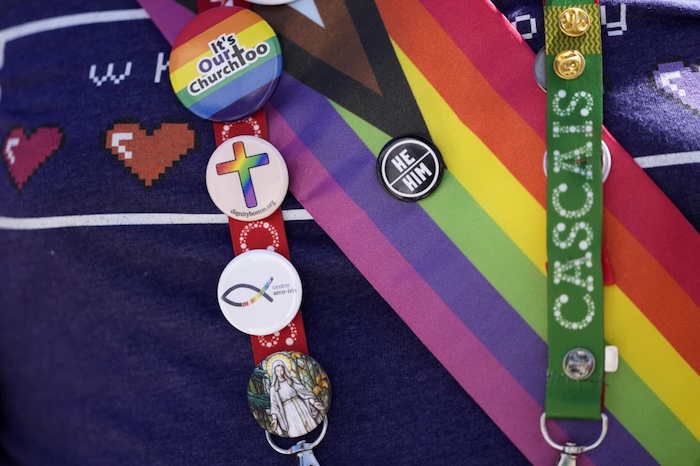
By DAVID CRARY
The Catholic Church, in its doctrine, still rejects same-sex marriage and condemns any sexual relations between gay or lesbian partners as “intrinsically disordered.” Yet Pope Francis, during his nearly 11-year papacy, has done far more than any previous pope to make the church a more welcoming place for LGBTQ+ people.
It became clear early in Francis’ papacy that he was going to articulate a gentler, more tolerant approach. The initial high-profile moment came in 2013 — during the first broadcast news conference of his papacy — with his memorable “Who am I to judge” comment when he was asked about a purportedly gay priest.
Signals of this approach had come earlier. As archbishop of Buenos Aires, he had favored granting legal protections to same-sex couples as an alternative to endorsing gay marriage, which Catholic doctrine forbids. The Vatican confirmed in 2020 that this was indeed the pope’s belief.
Some recent highlights:
In January 2023, Francis assailed the laws on the books in many countries that criminalize homosexuality and called for their elimination
“Being homosexual isn’t a crime,” Francis said during an interview with The Associated Press.
In 2008, under Pope Benedict XVI, the Vatican had declined to sign onto a U.N. declaration calling for an end to such laws.
Francis acknowledged that Catholic bishops in some regions support laws that criminalize homosexuality or discriminate against LGBTQ people. But he attributed such attitudes to cultural backgrounds, and said bishops need to recognize the dignity of everyone.
___
Another reversal came in late 2023, when the the Vatican made public a statement saying it’s permissible, under certain circumstances, for transgender people to be baptized as Catholics and serve as godparents.
The document was signed by Francis and Cardinal Víctor Manuel Fernández, who heads the Vatican’s Dicastery for the Doctrine of the Faith.
If it did not cause scandal or “disorientation” among other Catholics, a transgender person “may receive baptism under the same conditions as other faithful,” the document said.
Similarly, the document said trans adults — even if they had undergone gender-transition surgery — could serve as godfathers or godmothers under certain conditions.
The new pronouncement reversed the absolute bans on transgender people serving as godparents issued by the Vatican doctrine office in 2015. Among the beneficiaries: a community of transgender women — many of them Latin American migrants who worked in Rome as prostitutes — who made monthly visits to Francis’ weekly general audiences and were given VIP seats.
The pope’s outreach to trans people contrasts with the stance of some conservative Catholic prelates. In the United States, several dioceses have targeted trans Catholics with restrictions and refusals to recognize their gender identity. Yet at the same time, a growing number of U.S. parishes have welcomed trans people.
___
The pope’s mixed record on LGBTQ+ issues was epitomized by the Vatican’s 2023 synod bringing together hundreds of bishops and lay people from around the world to confer on the future of the church. The advance agenda specified that LGBTQ+ issues would be discussed; one of Francis’ hand-picked delegates was the Rev. James Martin, a U.S.-based Jesuit priest who is one of the most prominent advocates of greater LGBTQ+ inclusion in the church.
Yet when the final summary of the three-week synod was released, there was not a single mention of LGBTQ+ people, reflecting the influence of Catholic conservatives who oppose Francis’ overtures to that community.
___
On Monday, the Vatican released a document in which Francis formally approved allowing priests to bless same-sex couples, stipulating that people seeking God’s love and mercy shouldn’t be subject to “an exhaustive moral analysis” to receive it.
The document elaborates on a letter Francis sent to two conservative cardinals that was published in October. In that preliminary response, Francis suggested such blessings could be offered under some circumstances if they didn’t confuse the ritual with the sacrament of marriage.
The new document repeats that condition and elaborates on it, reaffirming that marriage is a lifelong sacrament between a man and a woman. And it stresses that blessings in question must be non-liturgical in nature and should not be conferred at the same time as a civil union, using set rituals or even with the clothing and gestures that belong in a wedding.
Even with these conditions, it’s a marked change from 2021, when the Vatican’s Congregation for the Doctrine of the Faith said flat-out that the church couldn’t bless the unions of two men or two women because “God cannot bless sin.”
Complete Article ↪HERE↩!
US archbishop secretly backed bid to free priest convicted of raping child
— ‘I join you in the prayer to guide those regarding your appeal,’ Gregory Aymond of New Orleans wrote to priest given life sentence
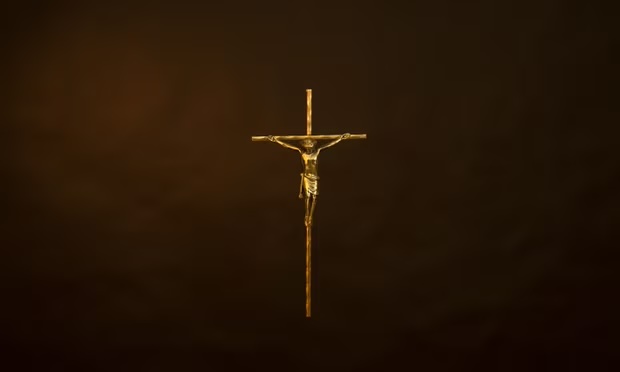
As he reached the end of his 41-year life, Kevin Portier had endured child rape at the hands of a southern Louisiana Catholic priest for whom he had served as an altar boy; a highly publicized trial that sent the clergyman to prison for the rest of his days; and the trauma associated with those experiences.
But one of Portier’s harshest ordeals came within his final two years alive. Representatives of the church that he had been raised to believe in approached him at his home, at his job and at a relative’s funeral to ask him to lend his support to efforts to secure an early release for his rapist, Robert Melancon.
“I don’t know what the real deal is,” Portier wrote in a fall 2017 email seeking answers from leaders of his local diocese, who didn’t realize until later that the people lobbying for Melancon’s release were actually church officials about 60 miles away in New Orleans. “And [it] doesn’t matter. All that matters now is I will not be lied to by the Catholic church.”
It’s unclear whether Portier, before his death in the spring of 2019, ever learned exactly who was trying to engineer an early release from prison for Melancon. But records that the Catholic archdiocese of New Orleans has fought to keep hidden show the city’s archbishop Gregory Aymond – while not even being in charge of him – furtively sanctioned legal maneuvers that, if successful, would have prematurely freed Melancon from what Portier considered to be a just punishment.
Meanwhile, one of the attorneys who played a key role in the campaign to free Melancon, VM Wheeler III, would himself later be convicted of molesting a child – an act of abuse that occurred years before, but that was not reported to authorities until after he joined New Orleans’s Catholic clergy as a deacon.

The records in question make clear that the effort to free Melancon involved overtures by affiliates of the archdiocese of New Orleans to the highest levels of government: to the warden of the prison where the convicted rapist was incarcerated, to the director of Louisiana’s department of corrections, and to the state’s governor himself.
It brought tension between New Orleans’ archdiocese and its smaller counterpart in Louisiana’s Houma-Thibodaux region, which administered the church where Portier served and met Melancon. After learning an early release for Melancon was a possibility, the bishop of the Houma-Thibodaux diocese told his New Orleans colleagues that he did not support it, regardless of arguments that the convicted rapist deserved it because he was enfeebled at the time.
Ultimately, Melancon died in prison in November 2018 at age 82, as Portier had wanted, before his own life ended about 18 months later.
Nonetheless, the saga of Portier’s pain vividly demonstrates how actions undertaken by the archdiocese of New Orleans in private often do not match its public pledges of empathy for survivors of its decades-old clerical abuse crisis.
The US’s second-oldest Catholic archdiocese, under Aymond’s leadership, declared bankruptcy in 2020, saying it was the most fair way for the organization to make whole hundreds of people abused by its clerics while allowing the church to continue carrying out its intended mission of sharing the gospel.
“The healing of victims and survivors is most important to me and to the church,” Aymond wrote in a letter to the approximately half-million Catholics in the New Orleans area shortly after the bankruptcy filing.
The archdiocese filed for bankruptcy after paying $11.7m in out-of-court, abuse-related settlements during a 10-year period beginning in 2020. The proceeding has now cost the archdiocese nearly $34m in legal and other professional fees; remains unresolved; and therefore has not yet resulted in any compensation for those with pending abuse claims.
Records that lay out the efforts to free Melancon are not publicly accessible because of a secrecy order from a judge that took effect shortly after the archdiocese declared bankruptcy. The Guardian obtained them through a law enforcement source.
Other confidential records obtained and reported on by the Guardian have established that the archdiocese over the last several decades has gone to extremes to shield abusive clergymen as long as possible – including the handful of ones convicted of or charged with crimes by authorities armed with subpoena powers that can pierce the church’s protection.
New Orleans church officials in a prepared statement maintained: “Archbishop Aymond had no role in requesting or advocating the department of corrections for the temporary release of Robert Melancon for medical reasons in accord with the department’s health care policy. Archbishop Aymond initially considered allowing Melancon to be housed at [an archdiocesan-run nursing home named] Wynhoven under certain conditions but ultimately decided against allowing Melancon to live in an archdiocesan facility.”
The records surrounding the effort to free Melancon – temporarily, if not permanently – stopped short of describing him as terminally ill at the time. Yet the church’s statement also sought to characterize a letter that Aymond sent to Melancon expressing support for an early release as “a corporal work of mercy” consistent with the archbishop’s “pastoral ministry to a dying prisoner”.
Portier’s father, Wilson Portier, said in a brief interview that he was generally aware there had once been efforts to free his son’s rapist from his life sentence. Yet he said he was stunned to learn those had been carried out in part by another convicted abuser – as well as endorsed by Aymond, who wasn’t even technically Melancon’s boss.
“Everybody’s got a right to a lawyer,” Wilson Portier said of those who had backed an early release for Melancon. “But they’ve got to live with their conscience that they knew – they already knew – he had abused somebody.”
‘Leaving it in God’s hands’
Portier pursued rape charges against Melancon at a time when most of the public could not grasp that clergymen were capable of sexual abuse.
It was late June 1995 when police arrested Melancon on accusations that he had raped Portier for several years beginning when he was eight, in about 1985. Several more years would pass after Melancon’s arrest before the 2002 Catholic clergy abuse scandal in Boston’s archdiocese opened the world’s eyes to priests and deacons who were child rapists – and their supervisors who enabled them.
Portier said Melancon began raping him almost immediately after he became an altar boy at Annunziata church in Houma, Louisiana. Melancon was the pastor there. Portier was 18 and Melancon nearly 60 when police made an arrest in the case.
An anonymous donor posted a $500,000 bond for Melancon to be out of police custody while awaiting his trial. The trial occurred about a year later, which is a relatively fast turnaround in Louisiana’s often sluggish criminal justice system.
Local media coverage captured the climate that greeted Portier. Supporters of Melancon insinuated that he had been unfairly targeted for political and religious persecution because the local top prosecutor’s father was Jewish.
By that time, the Houma-Thibodaux diocese had paid Portier $800,000 to settle litigation stemming from his abuse. It was not the church’s practice to pay that kind of sum if it believed someone was lying. Yet Portier faced accusations from defense attorneys that his only motivation to come forward against Melancon was greed.
In taking the witness stand against Melancon, Portier testified that he had gone ahead with the criminal trial despite having received his settlement because he didn’t want his abuser to rape again.
“I feel I would have the peace of mind – the peace of mind that he won’t do this to anyone else,” Portier said.
Portier’s testimony received a significant boost from another witness who testified that Melancon had recruited him to be an altar boy and molested him for several years. For that torment, the witness said he got a $30,000 payment from Melancon’s superiors.
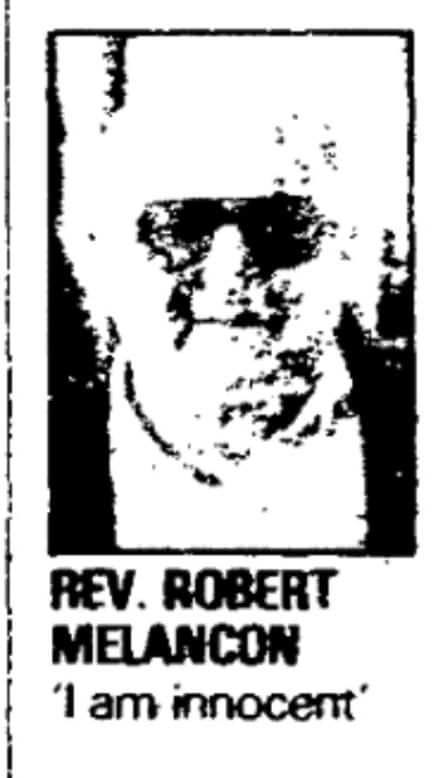
The jury hearing the case against Melancon deliberated fewer than two hours before finding him guilty of aggravated rape. As a result, Melancon was handed a mandatory sentence of life imprisonment.
Though the jurors’ brief deliberations suggested they strongly believed Portier, Melancon vehemently maintained his innocence. He told the judge presiding over his sentencing: “Your honor, I am innocent of these trumped-up charges that have been brought against me.”
He later wrote in gratitude to a college journalist who had penned a column expressing skepticism of Portier, highlighting some inconsistencies between his testimony during the criminal trial and the civil litigation. Melancon thanked Michael Heinroth, saying: “My faith in the justice system as well as my faith in my church has almost disappeared.”
Melancon also wrote that Heinroth’s favorable take on his defense salvaged at least some of his flagging faith in the news media.
“I still have a difficult time believing all this is really happening,” Melancon wrote to Heinroth, who acknowledges learning a lot more about the nature of the Catholic clergy abuse crisis since writing his student newspaper opinion piece challenging Portier’s credibility. “A young man of questionable character … tells an outrageous allegation [about] me … and not only the jury, but many others believe it!”
Portier was much more reserved in his response to the verdict against Melancon. He declined to discuss his case in public, and his only remark to the Louisiana newspaper the Advocate was: “I’m leaving it in God’s hands.”
‘No threat to public safety’
Melancon had been imprisoned for more than two decades when the New Orleans attorney VM Wheeler III sent a letter, on 19 July 2016, to the warden of the Homer, Louisiana, correctional center where Portier’s convicted rapist was housed.
About two years later, the archdiocese of New Orleans ordained Wheeler as a deacon. Months before his death in April, Wheeler pleaded guilty to indecent behavior with a juvenile after being accused of molesting a 12-year-old boy two decades earlier.
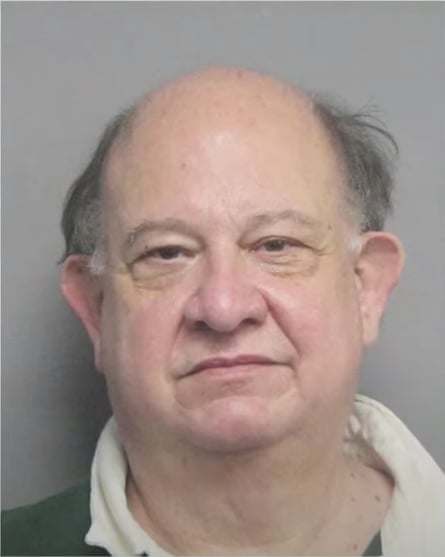
All of that was still ahead for Wheeler when he reached out on behalf of Melancon. At that moment, he argued in favor of an early release for the priest because of a new state prison policy meant to benefit certain infirm incarcerated people.
On the letterhead of the influential New Orleans law firm where he worked at the time, Chaffe McCall, Wheeler listed Melancon’s various maladies, including hypertension, type II diabetes, an enlarged prostate and coronary artery disease.
“We believe that, given his medical condition, Melancon poses a low risk of danger to himself or society and no threat to public safety,” Wheeler wrote to the warden.
Adding that the imprisoned clergyman was “permanently and irreversibly wheelchair and bed bound”, Wheeler said the plan was to place Melancon in an archdiocesan-run assisted living facility in the New Orleans suburb of Marrero if he were granted a medical release.
Wheeler wrote that Melancon would not be anywhere near any “sites of congregation for juveniles”, though a Catholic elementary school would have been about a half-mile away.
A week later, the pastor of the Metairie, Louisiana, church where Wheeler would later be assigned as a deacon wrote a letter to Aymond.
Andrew Taormina’s missive mentioned the new state prison policy, which could have led to an early, medical-related release for Melancon. It mentioned that the warden of the prison where Melancon – Taormina’s former classmate – was being kept had already given encouraging news.
The warden, Jerry Goodwin, “has expressed his opinion that Bobby will qualify for this temporary (and perhaps permanent) release to a nursing facility”, Taormina wrote to Aymond. To give him the best shot possible, Taormina added, Aymond would need to approve the plan to move Melancon into the Marrero nursing home, colloquially known as Wynhoven.
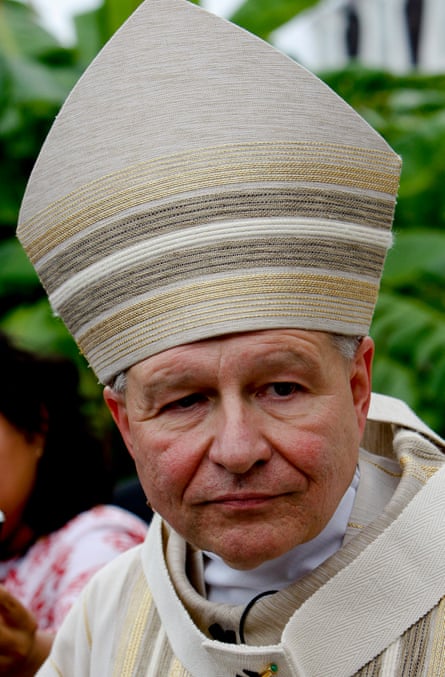
“We are told that things could go very quickly for Bobby if he qualifies for ‘furlough’ release,” Taormina wrote.
A stamp on Taormina’s letter shows Aymond’s office received it. Handwritten notes on the document read: “Will it be announced? … Will victims be notified? … Cost who will absorb?”
At the beginning of 2017, Taormina sent another pair of letters: one to Louisiana’s piously Catholic governor, John Bel Edwards, and one to his secretary of corrections.
Taormina’s letter to both argued that Melancon’s various health problems made him eligible for at least a temporary medical furlough that he could spend at Wynhoven. The transfer would both prevent Melancon’s health from continuing to deteriorate in prison and save the state some money as it grappled with a strained budget, Taormina wrote.
“We have met with Archbishop Gregory Aymond, and he is open to Father Melancon ultimately being housed at Wynhoven,” Taormina asserted in his letter to Edwards.
In his separate letter to the corrections secretary, James Le Blanc, Taormina said he hoped to obtain letters of support from the sheriffs and district attorneys of the parishes – Louisiana’s term for counties – where Portier had been abused and where Wynhoven was located.
In August of that same year, Melancon – whose priesthood had not been stripped from him – sent a pair of handwritten notes directly to Aymond.
One was to complain that the bishop to whom he reported, Houma-Thibodaux’s Shelton Fabre, had instructed him to stop celebrating mass in prison as a priest because he was prohibited from doing so given his conviction.
Melancon – who at the time was purportedly bed-bound, if his supporters were to be believed – did not appreciate being called out for his masses in prison. “This man rebukes me for answering God’s call,” Melancon wrote to Aymond. “All I did [was] feed God’s people with the bread of life. No one will take that joy from me – not even a bishop.”
In the other note to Aymond, which was dated a few days earlier, Melancon said he understood that Taormina was scheduled to have a meeting in Baton Rouge – Louisiana’s capital – about his appeal for an early release from prison.
“I asked Our Lady to guide them to make a positive decision,” Melancon wrote, referring to the Virgin Mary. He added that he had heard “nothing” from Fabre’s diocese and complained that he felt as if he had been “tossed aside like a used candy wrapper”.
Aymond sent one reply to Melancon in between the dates of his notes.
“Dear Bobby,” Aymond’s note said in greeting. “I join you in the prayer to Our Lady to guide those regarding your appeal to make a positive decision. We leave such things in the hands of the Lord and pray for His compassion and for justice.
“I am sorry that you feel tossed aside by some in the church. Be assured of my deep respect for you, appreciation for your many years of ministry and for your life of faith that you continue to live now.”
‘I’m going to let it rest’
While few Louisianans knew of the clandestine efforts by some in the church to help Melancon win an early release from prison, Portier learned of them by September 2017 because some of the disgraced clergyman’s supporters had personally approached him. Portier reported as much in emails to the Houma-Thibodaux diocese.
The emails collectively described a private investigator showing up at Portier’s home near Houma – in the area where he had been abused and where he still lived – “with an old priest … from … New Orleans”. He also said the church had somehow found time “to send attorneys” to intercept him at his home, at his job while he was on the clock, and as he attended his uncle’s funeral.
The visitors were “trying to get the priest that raped me out of jail”, Portier wrote.
“I know the old priest also went to the district attorney’s office and asked them to file a petition for end of life release” for Melancon, Portier added.
Portier warned his local diocese: “Please … inform all of [your] legal representation that the next time they show up at my home or family event I will press charges for harassment.”
An emailed reply from the Houma-Thibodaux diocese to Portier established that he soon spoke with the local liaison for clergy abuse victims, who previously had worked in Aymond’s administration. The email from the liaison – Carmelita Centanni – to Portier made clear “that the Diocese of Houma-Thibodaux is not involved in any way in any effort to get Robert Melancon released from prison”.
A burst of other written communication around that time shows that the Houma-Thibodaux bishop Fabre spoke with Aymond and wrote to Taormina, who turned 87 in July.
In a letter to Taormina, Fabre stopped short of accusing him of being the “old priest” from New Orleans whom Portier described. Fabre also described being informed by a local journalist that both “an unnamed priest [and] unnamed bishop” had recently gone to the local district attorney “to speak about the possibility of getting Robert Melancon released from prison”.
But Fabre – who has since become the archbishop of Louisville, Kentucky – also didn’t accuse Taormina of being the priest who visited the DA. He only wrote: “If you are not the priest referenced and you know who [he] is, then I would appreciate knowing his name so that I can contact him and share my very serious concerns about the Diocese of Houma-Thibodaux being perceived as participating in this effort in any manner.”
The campaign for Melancon to be freed from prison fizzled out there, by all indications.
Melancon has been accused of additional sexual violence as recently as August, when a woman filed a claim in the New Orleans archdiocese’s bankruptcy case accusing him of abusing her when she was 13.
The woman, who is seeking damages, said Melancon fondled her genitals and forced oral sex with her on multiple occasions in his car while it was parked outside churches and down the street from a fair, among other settings.
Her complaint said her abuse began in the late 1960s, when Melancon reported to the New Orleans archdiocese because the Houma-Thibodaux diocese had not yet been founded. The claim was filed past a key bankruptcy deadline, but the woman said she hadn’t learned about the date until recently. So she requested special permission to pursue her claim, which remains unsettled.
Melancon died in prison of natural causes on 5 November 2018. Coincidentally, that was three days after Aymond published the first version of a list of priests and deacons who had ministered in New Orleans and were considered credibly accused of child molestation – a roster meant as a gesture of transparency and solidarity for abuse victims.
That list did not name Melancon, though a similar one released later by the Houma-Thibodaux diocese did.
Melancon’s death brought no closure to Portier, who never received an apology from his rapist.
“When a child is hurt like that, it never, ever goes away,” Portier told The Times of Houma/Thibodaux after Melancon’s death. “It is always there.
“I don’t know how a man of God would not try to close that, to go to his death without forgiveness.”
Furthermore, those campaigning for Melancon’s release had triggered Portier’s anxiety over his rape in a major way, his father said.
“He was on edge all the time that [Melancon] was going to get out and come back and get him,” Wilson Portier said. “His mental state was always locking the windows and making sure the door was locked. He called in the middle of the night [worried] somebody was trying to get into his house and stuff like that.”
Portier said his son had tried to treat his trauma by working with therapists. Kevin Portier was still in the middle of that fight when his father said he died of a heart attack on 23 March 2019, leaving behind his parents, his brother, his sister-in-law, a niece and a nephew to grieve.
Wilson Portier listened silently to some of the supportive words Aymond, Taormina and Wheeler wrote on behalf of his son’s rapist. Asked if there was any response he wanted to put on the record, he replied: “Well, I got a lot to say about it but I’m not going to say anything.”
Referring to his late son and the man who raped him, Wilson Portier said: “I’m going to let it rest – because they’re both dead, right?”
Complete Article ↪HERE↩!
Father James Jackson Sentenced to 6 Years in Prison for Child Pornography
— Father Jackson, 68, a priest of the Priestly Fraternity of St. Peter, was originally arrested in October 2021 at St. Mary’s Catholic Church in Providence, Rhode Island, where he was serving as pastor.

By Joe Bukuras
Father Jackson, 68, a priest of the Priestly Fraternity of St. Peter, was originally arrested in October 2021 at St. Mary’s Catholic Church in Providence, Rhode Island, where he was serving as pastor.
Father James Jackson was sentenced Wednesday to six years in prison and five years of probation after he pleaded guilty to a child pornography charge in June.
Judge William Smith, sitting in U.S. District Court in Providence, Rhode Island, gave Father Jackson a sentence a year longer than was recommended by both the prosecution and his defense attorney, citing his role of “authority” and “responsibility” as a Catholic priest.
Father Jackson, 68, a priest of the Priestly Fraternity of St. Peter (FSSP), was originally arrested in October 2021 at St. Mary’s Catholic Church in Providence, Rhode Island, where he was serving as pastor. The arrest came after an investigation into him by state law enforcement found child pornography on his laptop and external hard drive.
Smith also cited Father Jackson’s violation of his pre-trial release when he was living in Kansas with his sister and viewed more child sexual abuse material.
“You are more than familiar with the concept of free will,” Smith said. “I think you had free will in making that decision about whether to reengage with this material.”
In addition to paying restitution to victims, Father Jackson will have to register as a sex offender when he is released from prison. Father Jackson requested — and the judge said he would recommend — that he serve his prison time in Kansas, where his sister, Susan Whitfield, lives.
Whitfield and another supporter of Father Jackson’s were in the courtroom on Wednesday. A white-bearded Father Jackson, wearing a yellow and brown jumpsuit, looked down for most of the hearing.
In a statement before the court, Father Jackson said he was glad that the police caught him and stopped him from committing this “heinous crime and horrible sin.”
He apologized to all law enforcement who had to view the “filth” of child pornography while investigating the case. He also said he was sorry for all the people he has hurt, including children, family, friends, colleagues, brother priests, former parishioners, former students, the Church, the country, and his “savior.”
“So, I ask for only one thing; it’s this: that anyone who is here today who hears this or others who hear of it on the outside, that they would pray for me, for this intention, that the repentance and penitence which I began some time ago before my incarceration, that that will continue and not just continue but grow deeper and be even perfected,” Father Jackson said.
He added that he is “utterly ashamed” and “bitterly” regrets viewing the material. “I hope that I will persevere in that repentance and penitence till the end of my days,” he said.
Father Jackson’s sentencing marks an end to more than two years of federal legal proceedings involving the priest who was held in high esteem as a spiritual leader, an expert on the traditional form of the Mass, and a friend to many of his former parishioners and brother priests in the traditionalist religious community.
Father Jackson signed a plea agreement in June admitting to a single charge of receipt of child pornography, while prosecutors moved to dismiss a second count of possession of child pornography.
CNA reached out to Father Jackson’s lawyer, John Calcagni, for comment but did not hear back by time of publication. A spokesperson for the U.S. attorney’s office said a press release would be issued on Wednesday.
After Father Jackson’s arrests in Rhode Island in 2021, he was initially charged with both federal and state offenses, but the state charges were dropped as a procedural move in January 2022.
News of his arrest in October 2021 shocked many of his friends, supporters, and former parishioners, with many who saw Father Jackson as a holy priest rushing to his defense.
Under the terms of his release from federal court in November 2021, Father Jackson was allowed to return to his home state of Kansas to live with his sister while waiting for the charges to be adjudicated.
While in Kansas, an additional child pornography investigation into Jackson was conducted by a local police department. Father Jackson’s federal probation officer issued a petition to the U.S. District Court of Rhode Island alleging that the priest broke the conditions of his pre-trial release while he was allowed to live in Leawood, Kansas, with his sister.
In the petition, Father Jackson’s probation officer, David Picozzi, said that the U.S. Probation Office in the District of Rhode Island was contacted by Overland Park Police Department Detective Christopher Moore on July 11, 2022.
Moore told the office that there was a search warrant issued for Father Jackson’s residence in Leawood “in response to a child pornography investigation in which Mr. Jackson was the primary target,” the petition says.
U.S. Marshals arrested him and brought him back to the Donald W. Wyatt Detention Facility in Central Falls, Rhode Island, where he has remained in custody.
A spokesman for the Overland Park Police Department told CNA in May that Father Jackson will be charged with a crime once the charges in Rhode Island are adjudicated.
A spokeswoman for the Johnson County District Attorney’s office in Olathe, Kansas, told CNA Tuesday that charges have not yet been filed.
A court document filed in December revealed that Father Jackson told authorities in his pre-sentence investigation interview that he was sexually abused as a child by the mother of another child in his Boy Scout Troop when he was 10 years old.
Included in court documents is Father Jackson’s Aug. 6 written apology to his community, the Priestly Fraternity of St. Peter.
“The vile sin into which I fell, and for which I am guilty, has caused immeasurable harm,” Father Jackson, the former pastor of St. Mary’s Church in Providence, Rhode Island, wrote.
“I have sinned against God, children, you, friends, and family, former students and former parishioners, and many others besides,” he wrote.
“I cannot repair this damage, but I must try,” he wrote. “I hope you will accept this apology. I’m sorry at a level I’ve never experienced before. I’m ashamed beyond any shame I’ve known.”
He wrote: “I will be offering reparations, penances, and what good works I can for you, long after I am dismissed from the fraternity, and praying for you, in a reformed life, until my dying day.”
Complete Article ↪HERE↩!
Cardinal found guilty of embezzlement in Vatican ‘trial of the century’
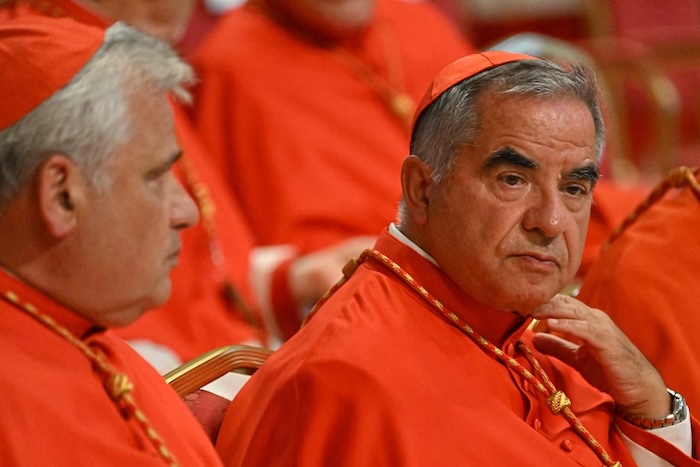
By Anthony Faiola and Stefano Pitrelli
Inside the high walls of the Holy See, Cardinal Giovanni Angelo Becciu — former head of the office of “miracles” that minted saints — was considered papabile, a possible next pope.
Then his career collided with church prosecutors, who charged the 75-year-old Italian and nine other officials with corruption, setting up the Vatican’s trial of the century.
On Saturday, Becciu — the first cardinal tried by the Vatican’s little-known criminal court — was found guilty of several counts of embezzlement after a trial of marred by allegations of witness tampering and papal interference. Becciu was sentenced to five years and six months in a verdict read out in a converted quarter of the museum that houses the Sistine Chapel.
Becciu’s lawyers said the decision would be appealed, but it put the cardinal closer to one of Vatican City’s handful of jail cells — a result that amounts to both a sign of accountability and embarrassment for an institution that has long struggled to root out corruption. He was also barred from holding any Vatican office.
The case, a marathon of 86 courtroom hearings that mixed a hodgepodge of various charges, further exposed the murky world of Vatican finances, as well as the pope’s crusade for accountability, even, critics argued, at the cost of the rule of law. The star defendant was always Becciu, once a papal confident who renounced his senior post after a surprise 2020 meeting in which Pope Francis dramatically confronted him with the accusations against him. Francis stripped him of his privileges as cardinal before any finding of guilt. Later, some of those rights were unofficially reinstated.
The Vatican, meanwhile, emerges worse for wear, with new questions raised about the effectiveness and fairness of its legal system. Portrayed as an exercise in transparency under a crusading pope, the case nevertheless appeared to backfire in key ways, opening an unwanted window into the intrigue, infighting and ineptitude at heart of the world’s smallest sovereign state.
“The pope ended up kicking a hornets’ nest,” said Giovanni Maria Vian, a former editor of the Vatican newspaper.
A bad Vatican investment in a tony London property that ultimately led to massive losses prompted the sweeping investigation, including unprecedented raids of Vatican offices. As prosecutors dug, they claimed Becciu had wrongly funneled 125,000 euros to a Sardinian charity run by his brother and another 575,000 euros to Cecilia Marogna, a Sardinian woman with a humanitarian organization in Slovenia who, Becciu said, was supposed to help free a kidnapped nun. Other senior Vatican officials who signed off on the London deal were never indicted, and the pope had been previously apprised of the transaction.
Before the trial began, Francis appeared to use his powers in ways that supporters saw as a quest for transparency, but critics called overreach by a man who serves as Vatican City’s absolute monarch. He approved a series of secret edicts aimed at empowering prosecutors, including one allowing investigators to engage in wiretapping.

As prosecutors sought to prove their case, they were plagued by setbacks, including questions about the credibility of their star witness and revelations that he had been coached by a Becciu enemy.
The trial came as a pope elected with a mandate to reform the Roman Curia — the opaque bureaucracy that runs Vatican City — was seen as having made strides, if still not enough, to improve financial transparency. The Vatican bank — long tainted by secretive accounting and money laundering scandals — underwent a cleanup during the past decade, a process begun under Pope Benedict XVI and accelerated under Francis.
Francis has also banned gifts to Vatican employees worth more than $50, and forced Holy See officials to sign a pledge that they have no assets in tax havens.
The Becciu case “says a lot about the pope’s will — theatrical and spectacular — to clean house,” said Emiliano Fittipaldi, an Italian journalist and noted Vatican watcher. He added, “Becciu became a sort of symbol, or a scapegoat, even if he didn’t commit any crime, of a system that had to be dealt with at last.”
Prosecutor Alessandro Diddi sought prison sentences between four and 13 years for the defendants, as well as nearly 500 million euros in restitution. Becciu maintained his “absolute innocence” and contended he did not steal “a single euro.” During the case, Becciu appeared to suggest the pope had turned on him even as he was forced to deny reports that he funded an international smear campaign against one of Francis’s fiercest conservative critics.
Some observers wondered why the Vatican sought to prosecute the complicated case that ran from Britain to Slovenia to Italy in the first place, rather than turn it over to better equipped Italian authorities.
After Francis became pope, Becciu, who formerly served as de facto chief of staff at the Vatican’s secretariat of state — its diplomatic arm — would frequently travel with him and was seen as one of the few men within the Holy See who could freely knock on the pope’s door.
During his time in that post, the secretariat invested in a luxury building on London’s fashionable Sloane Avenue through an Italian financier, Raffaele Mincione. The property had once served as warehouses for the Harrods department store. With upgrades, the Vatican was supposed to make a mint.
Instead, it turned out that the property had been radically overvalued. It was sold last year at a $175-million loss. But before that, attempts by the secretariat to refinance a loan through the Vatican bank set off alarm bells that got back to the pope and triggered the broader investigation.

On the stand, Becciu decried his transformation from pious cleric to “monster.” Behind the scenes, he set out to prove his innocence. In 2021, before the trial started, he wrote a series of letters to Francis, urging the pope to confirm he had knowledge of, and even supported, the London deal.
Becciu additionally asked Francis to admit he had prior knowledge of the agreement with Marogna, the woman with the charity in Slovenia who was paid an exorbitant fee for unclear services. Becciu has said he believed the money was going to assist the liberation of Sister Gloria Cecilia Narváez, a Colombian nun kidnapped in 2017 in Mali.
In a subsequent call to Francis, made the day after the pope was released from a Rome hospital for colon surgery, Becciu secretly recorded the pontiff, who appeared sympathetic to his plight. But a follow-up letter to the pope requesting his written support against the charges resulted in a frosty letter in legalese, in which Francis expressed his “surprise” at Becciu’s request and said he could not help him.
The prosecutors’ case in part rested on the testimony of Monsignor Alberto Perlasca, the Vatican official who had signed contracts related to a London property in 2018. Initially a target of the investigation, he altered his testimony and became a witness for the prosecution against Becciu. Former Vatican diplomat Francesca Chaouqui — jailed for 10 months in connection to the Vatileaks scandal which was seen as helping to prompt Pope Benedict XVI’s resignation — later testified that she had sought to influence Perlasca after blaming Becciu for playing a role in her downfall.
Complete Article ↪HERE↩!
